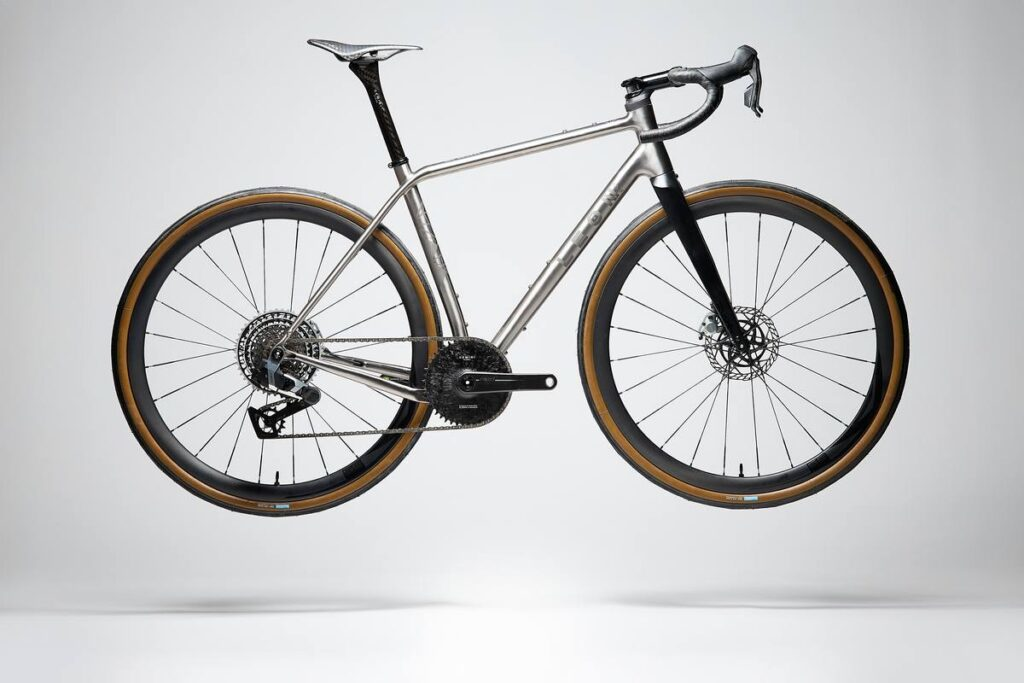RAAVE vs LaRage: Understanding the geometry to make a better choice
In the world of high-end gravel bikes, choosing a frame isn't just about design or materials. A bike's geometry profoundly influences its handling, responsiveness, and long-term rider comfort. At CYKL , we believe that a well-informed buyer makes a better choice.

RAAVE 2025
This article compares two titanium bikes in the same category — sporty gravel — but with very different personalities: the RAAVE from CYKL, and the LaRage from the Leon brand.

Leon LaRage
Our goal? To give you clear and concrete benchmarks to understand what each number implies once you're in the saddle.
🔍 Detailed analysis of geometries
Reach
Reach measures the horizontal distance between the bottom bracket and the head tube. It is an indicator of the rider's position and the bike's handling.
- RAAVE : 370 to 405 mm
- LaRage : 410 to 437 mm
 The RAAVE is more compact. It allows for a more upright riding position, with a more centralized center of gravity. The result: greater responsiveness and agility, especially during acceleration and quick changes of direction.
The RAAVE is more compact. It allows for a more upright riding position, with a more centralized center of gravity. The result: greater responsiveness and agility, especially during acceleration and quick changes of direction.
![]() Stack
Stack
The stack height is the distance between the bottom bracket and the top of the head tube. It directly affects ergonomics and overall riding position.
- RAAVE : 519 to 612 mm
- LaRage : 550 to 617 mm
The RAAVE offers a lower stack height, providing a more aerodynamic and sportier riding position. The LaRage, on the other hand, allows for a more upright and relaxed position, particularly for long distances.
Reach/Stack Ratio
This composite indicator allows you to assess the "sporty character" of the geometry. The higher the ratio, the sportier the bike (long reach, low stack).
- RAAVE : up to 1.51
- LaRage : approximately 1.40 to 1.48
The RAAVE clearly positions itself as a bike with modern, dynamic geometry and geared towards performance.
Steering angle
This angle influences the stability and handling of the bicycle.
- RAAVE : 70° to 72°
- LaRage : 70° to 71.6°
 A narrower angle (RAAVE) provides more responsive, precise handling. The more open LaRage angle promotes stability at high speeds.
A narrower angle (RAAVE) provides more responsive, precise handling. The more open LaRage angle promotes stability at high speeds.
![]() Seat angle
Seat angle
Determines leg position and pedaling efficiency, especially uphill.
- RAAVE : 75° to 72.5°
- LaRage : 75.5° to 73.5°
The two are similar, but the RAAVE offers a slightly more forward position for more active pedaling.
Chainstays
This parameter affects the stability and responsiveness of the bike.
- RAAVE : 420 to 425 mm
- LaRage : 420 mm fixed

The RAAVE varies the wheel length between sizes to optimize traction and balance. The shorter chainstays make the bike more responsive, ideal for acceleration.
🧠 Summary of behaviors
RAAVE – CYKL
A modern and sporty gravel bike. Compact, agile, and responsive, it's designed for those who love to ride fast, attack singletrack, and perform on roads and trails. Its geometry is taut and precise, with a true "race" feel.
![]()
 LaRage – Léon
LaRage – Léon
A stable, reassuring gravel bike with a greater focus on comfort. It will be better suited to those who prioritize distance, versatility, and reliability on mixed terrain, including when loaded (panniers, equipment).

Note : For those looking for a geometry closer to the LaRage, while remaining with CYKL, we also offer the GRAAVE .
❓ Questions about geometry?
Every cyclist is unique. Don't hesitate to contact us for personalized advice. Our technical teams can help you choose the size, configuration, and model best suited to your needs.
